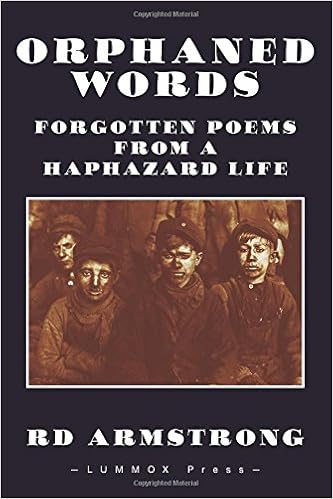
Orphaned Words:
Forgotten Poems from a Haphazard Life
by RD Armstrong
$20.00 USD + shipping, 246 pp
A Review by Judith Skillman
In RD Armstrong’s Orphaned Words, we find a rare honesty, beginning with the poet’s forward: “If it weren’t for LUMMOX Press, I’d be living out of my car, drunk on my ass and crazy.” It takes guts to say these kinds of things, and the poems that follow continue the dialogue, disarming the reader with a persona who is “…often misunderstood by women…”, one who explores arenas of politics, addiction, and the art of writing of poetry itself with the same truthfulness. For instance, on politics:
I am looking for peace and
finding cyclical History.
I am looking for justice
from an election stolen
from my progressive hopes. (p. 3).
On addiction: “I felt like I was drowning in an inch of bloody wine/like a moth doing the backstroke in a wine glass” (from Cinco de Malo, p 35).
The Ars Poetica (a poem which explains the art of poetry) quality of many pieces, rather than remaining academic, becomes a long riff returned to and left behind. Writing itself is questioned by the author’s perverse sensibility as the virtue of verse is turned on its head: “scratching lines in the dirt/would be more profitable” (from Immortal Lines, p. 100)
A Koan-like quality pervades many of these “orphaned words”. They are, by definition, not to be held accountable; so the speaker allows himself full liberty with language, which runs the gamut from ordinary to playful, from coined to concrete, from taboo to xxx-rated. Translation is included, as in “La Puerto del Diablo”. At the finale of this hybrid experiment, one of RD’s signature understatements emerges: “What a pity/I have a stick but/no marshmallows!” (p 111). The hilarity of this line in no way undercuts the devil’s very real pyre—a “vortex” into which the speaker is “being sucked”.
Throughout the collection, poverty—real or metaphorical—is allowed full rein: “Dreamed of a home that didn’t rock in the wind/a home that stayed in one spot/a fixed spot in the universe to return to/my spot.” (from Life on the Street, p. 114). The ultimate poverty of the poet is capitalized upon, in “The Quiet Revolution”: “Poetry is nothing but a cheap whore/To which we all must pay homage…” What follows levels the playing field. The tone softens and encourages the (young) poet, not unlike Rilke’s Letters to a Young Poet: “…poetry is the miracle/ of small things made large”.
Perhaps not so much as a saving grace but rather as a coping mechanism, a Zen quality permeates the later poems in the collection. Here the poet becomes an observer, as in “The Watcher” (p. 198)—“the visitor who never returns home/the tourist with no return ticket”. Dark as this revelation is, and despite its cognizance of mortality and futility, Orphaned Words is an epic that affirms even as it rages.
To order, go to www.lummoxpress.com/lc/orphaned/
About the author:
Judith Skillman’s recent book is Kafka’s Shadow, Deerbrook Editions, 2017. She is the recipient of a Eric Mathieu King Fund Award from the Academy of American Poets, an Artist Trust GAP grant, and the author of sixteen collections of verse. Visit www.judithskillman.com, https://www.facebook.com/judith.skillman
Recent Comments